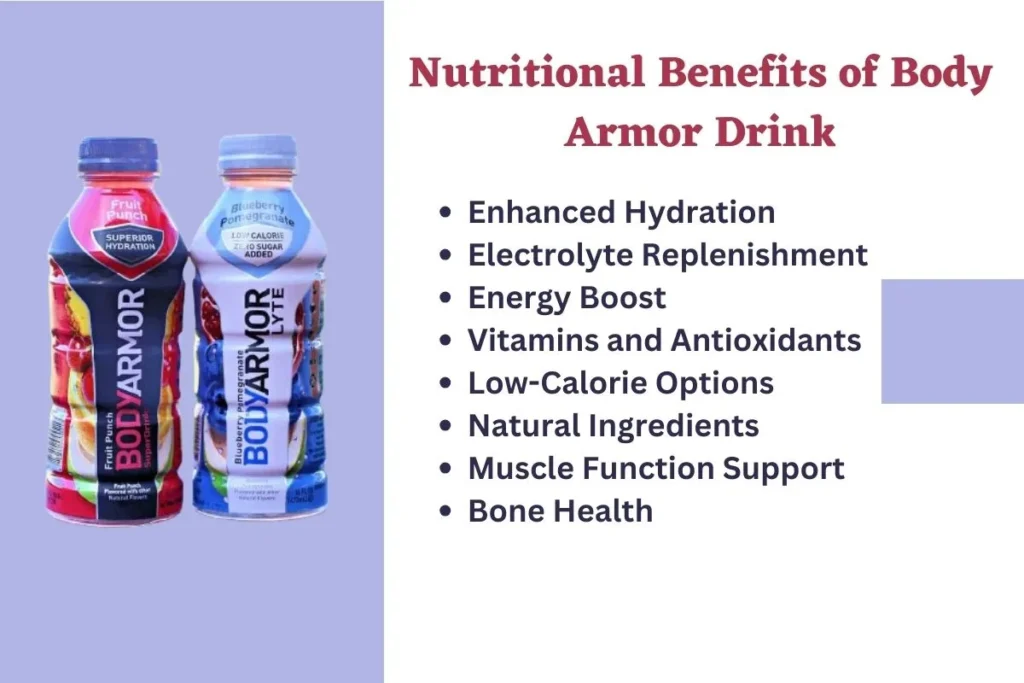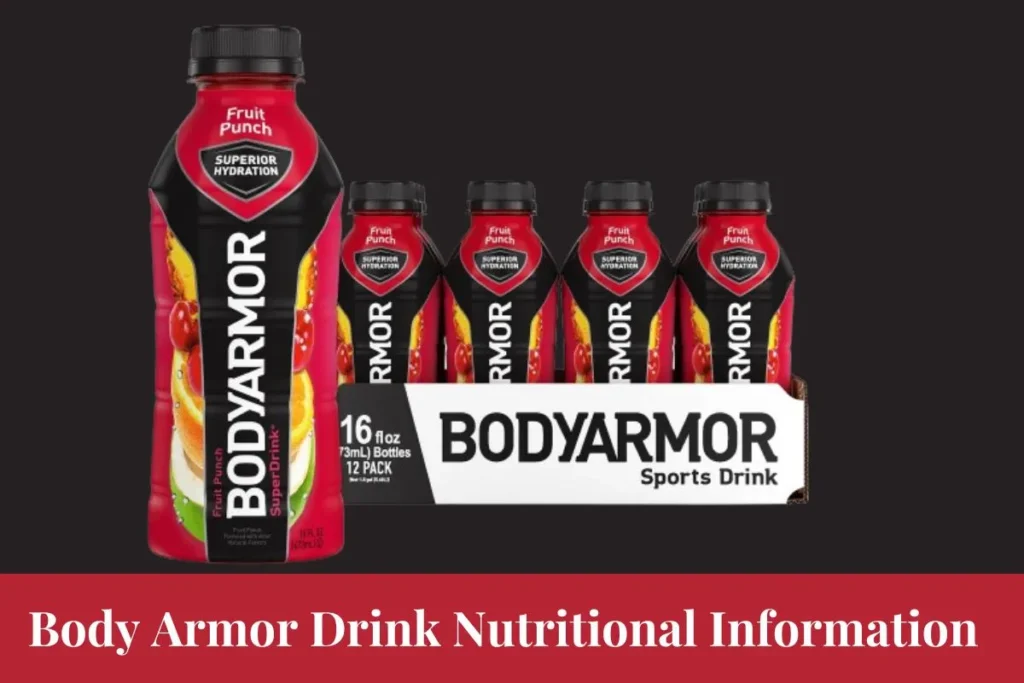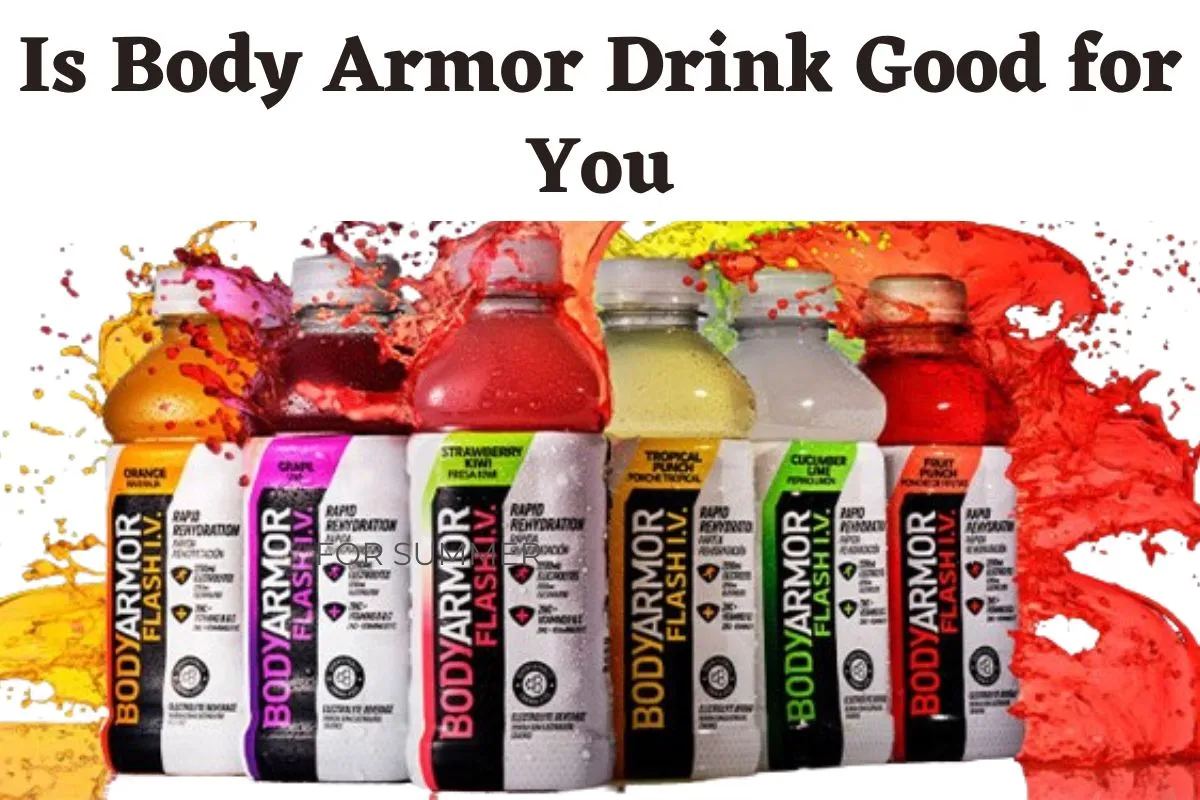A sports drink called Body Armor Drink is promoted as a healthier substitute for conventional sports drinks. It boasts a blend of electrolytes, vitamins, and coconut water, aiming to support hydration and performance during physical activity. In a health-conscious environment, consumers are always looking for drinks that are both nourishing and refreshing.
Body Armor Drink has become well-known among the plethora of options available due to its promises of supplying vital nutrients and hydration. Is Body Armor Drink Good for You? To find out whether it lives up to its health promises, let’s take a closer look at its components, advantages, and possible disadvantages.
Is Body Armor Drink Good for You? The Background of Body Armor Drink
The history of Body Armor Drink traces back to its inception in 2011 by Mike Repole and Lance Collins. The idea stemmed from their shared vision of creating a sports drink that offered superior hydration and nutritional benefits compared to existing options on the market. With a focus on natural ingredients and enhanced functionality, they sought to revolutionize the sports beverage industry.
Inspired by their own experiences as athletes and entrepreneurs, Repole and Collins embarked on a journey to develop a product that would cater to the needs of fitness enthusiasts, athletes, and health-conscious individuals alike. They assembled a team of experts in sports nutrition, flavor development, and marketing to bring their vision to life.
After extensive research and development, Body Armor Drink was officially launched in 2011 with the goal of providing consumers with a healthier alternative to traditional sports drinks. The initial lineup included a variety of flavors formulated to deliver electrolytes, vitamins, and hydration without artificial colors, flavors, or preservatives.
Body Armor Drink quickly gained traction in the marketplace, earning recognition for its innovative approach and commitment to quality. Athletes and celebrities began endorsing the brand, further boosting its visibility and appeal among consumers.
Today, Body Armor Drink is recognized as a trusted source of hydration and nutrition for athletes and active individuals worldwide. With a dedication to quality, transparency, and consumer satisfaction, the brand remains committed to its mission of helping people perform at their best and live healthier, more active lifestyles.
List of Ingredients in Body Armor Drink
The ingredients in Body Armor can vary slightly depending on the specific flavor and type (Sports Drink, Lyte, Edge), but here’s a general breakdown:
Common Ingredients
- Filtered Water: The primary base for any beverage, providing hydration without any impurities found in regular tap water.
- Citric Acid: Adds a tart flavor and acts as a preservative to maintain freshness.
- Dipotassium Phosphate (Electrolyte): Used as an electrolyte replenisher and to buffer the pH of the drink.
- Vegetable Juice Concentrate (Color): Provides natural color to the drinks without using artificial dyes.
- Ascorbic Acid (Vitamin C): An antioxidant that helps protect the body’s cells and boosts the immune system.
- Magnesium Oxide (Electrolyte): Serves as a source of magnesium, an electrolyte needed for proper muscle and nerve function.
- Niacinamide (Vitamin B3): Important for converting food into energy and maintaining healthy skin and nerves.
- Calcium D-Pantothenate (Vitamin B5): Essential for the metabolism of food, as well as the synthesis of hormones and cholesterol.
- Natural Flavors: Used to enhance the flavor of the drink without adding artificial substances.
- alpha-Tocopheryl Acetate (Vitamin E): An antioxidant that helps protect cells from damage and supports immune function.
- Zinc Oxide (Electrolyte): Provides zinc, which is crucial for immune function, wound healing, and DNA synthesis.
- Pyridoxine Hydrochloride (Vitamin B6): Important for brain development and keeping the nervous and immune systems healthy.
- Folic Acid (Vitamin B9): Essential for making DNA and other genetic material, and is especially important in prenatal health.
- Vitamin A Palmitate (Vitamin A): Important for vision, the immune system, and reproduction.
- Cyanocobalamin (Vitamin B12): Crucial for the formation of red blood cells and the proper function and health of nerve tissue.
Variant-Specific Ingredients
- Pure Cane Sugar: A natural sweetener derived from sugarcane, used to add sweetness to the “SPORTS DRINK” and “FLASH I.V.”.
- Coconut Water Concentrate: Used in several variants for its natural electrolytes and mild coconut flavor.
- Stevia Sweetener or Stevia rebaudiana Leaf Extract: A natural, zero-calorie sweetener used in the “Zero Sugar”, “LYTE”, and “FLASH I.V.” variants to add sweetness without added sugars.
- Erythritol: A sugar alcohol used in the “LYTE” variant as a low-calorie sweetener to provide sweetness without the calories of sugar.
- Guar Gum: Used in the “LYTE” variant as a thickener and stabilizer to improve texture.
- Gum Arabic and Ester Gum: Found in the “FLASH I.V.”, these are used as stabilizers to help maintain the emulsion of oils and water in the drink.
- Fruit Juice (Color): Used in “FLASH I.V.” for natural coloring.
- Turmeric Extract (Color): Provides natural color in the “FLASH I.V. STICKS”.
Electrolytes and Salts
- Potassium Citrate, Potassium Chloride, Sodium Lactate, Sodium Citrate, and Salt (Electrolyte): These compounds are used in various combinations across the variants to replenish electrolytes that are lost through sweat during exercise, which helps maintain fluid balance and muscle function.
By combining these ingredients, BODYARMOR sports drinks aim to provide hydration and nutrients to support physical activity and overall health.
Nutritional Benefits of Body Armor Drink

BODYARMOR sports drinks are not just about maintaining hydration; they provide a comprehensive solution to meet the dietary needs of active individuals. Their scientifically formulated blend of fluids, electrolytes, sugars, vitamins, and natural ingredients helps enhance athletic performance, facilitate recovery, and support an active lifestyle.
Here are some of the nutritional benefits provided by BODYARMOR drinks:
Enhanced Hydration
Hydration is crucial during physical activity to maintain peak performance and prevent dehydration-related issues like muscle cramps and fatigue. BODYARMOR sports drinks use filtered water as their primary ingredient, enhancing the body’s ability to retain fluids and stay hydrated.
Proper hydration is essential not only for maintaining the function of every system in the body, including the heart, brain, and muscles, but also for regulating body temperature and maintaining blood pressure.
Electrolyte Replenishment
BODYARMOR is enriched with essential electrolytes such as potassium, magnesium, and calcium. These are delivered through various salts like dipotassium phosphate, magnesium oxide, and calcium carbonate, which are critical for fluid balance and nerve function.
Electrolytes are vital for several bodily functions, including maintaining nerve and muscle function, hydrating the body, balancing blood acidity and pressure, and helping rebuild damaged tissues. Replenishing electrolytes is particularly important during extended periods of physical activity when they are lost through sweat.
Energy Boost
Some variants of BODYARMOR contain carbohydrates in the form of natural sugars, such as pure cane sugar. These sugars serve as an immediate energy source, which can be particularly beneficial during prolonged or intense physical activities. Carbohydrates are essential for fueling both the brain and muscles, helping to maintain endurance and performance.
Vitamins and Antioxidants
BODYARMOR drinks are fortified with a range of vitamins that support overall health and athletic performance. These include:
- Vitamin C: A powerful antioxidant that protects against oxidative stress and boosts the immune system.
- B Vitamins (B3, B5, B6, B9, B12): Essential for energy production and efficient metabolic processes.
- Vitamin E: Another antioxidant that helps protect cells from damage.
- Vitamin A: Important for good vision, skin health, and immune function.
These antioxidants are crucial for minimizing oxidative stress associated with intense exercise, thereby reducing muscle soreness and promoting quicker recovery.
Low-Calorie Options
For athletes watching their calorie intake or those interested in weight management, BODYARMOR offers zero-sugar variants. These drinks provide the same hydration and electrolyte benefits without the added sugars, utilizing natural sweeteners like stevia instead. This allows consumers to enjoy the benefits of a sports drink without consuming excess calories or affecting blood sugar levels.
Natural Ingredients
By employing natural flavors and avoiding artificial colors and sweeteners in most of their products, BODYARMOR appeals to health-conscious consumers looking for a more natural product. This commitment to natural ingredients aligns with a growing consumer demand for products free from artificial additives.
Muscle Function Support
Magnesium and calcium are included in BODYARMOR drinks to support muscle function. Magnesium aids in muscle relaxation and prevents cramping, while calcium is vital for muscle contractions and nerve signaling. Proper levels of these minerals can help prevent the muscle spasms often associated with dehydration and electrolyte imbalance.
Bone Health
Calcium, present in BODYARMOR drinks, is fundamental for maintaining strong bones, making it particularly important for athletes and physically active individuals. Regular consumption of calcium can help mitigate the risk of bone density loss and the long-term risk of osteoporosis.
Body Armor Drink Nutritional Information

The serving sizes vary depending on the product, with the Sports Drink, Zero Sugar, and Lyte coming in 16oz bottles, the Flash I.V. in a 20oz bottle, and the Flash I.V. Sticks in individual packets.
The calorie content ranges from 10 calories per serving for the Zero Sugar variant to 120 calories per serving for the regular Sports Drink. The Flash I.V. contains 80 calories per 20oz bottle, while the Lyte and Flash I.V. Sticks both have 15 calories per serving. It is important to note that none of these products contain calories from fat.
All the listed products have 0g of total fat, saturated fat, and trans fat. They also have no cholesterol content. The sodium content varies significantly among the products, with the Zero Sugar variant containing no sodium, the Sports Drink and Lyte containing 30mg per serving, and the Flash I.V. and Flash I.V. Sticks having higher sodium content at 530mg and 510mg, respectively.
Potassium content is relatively high in all the products, ranging from 530mg in the Flash I.V. to 700mg in the Flash I.V. Sticks. The Sports Drink, Zero Sugar, and Lyte contain 680mg, 620mg, and 680mg of potassium per serving, respectively.
The total carbohydrate content varies greatly, with the Sports Drink containing the highest amount at 29g per serving, followed by the Flash I.V. at 16g. The Lyte has 12g of total carbohydrates, while the Zero Sugar and Flash I.V. Sticks have 0g and 1g, respectively. None of the products contain any dietary fiber.
Sugar content also differs among the products, with the Sports Drink having the highest amount at 29g per serving, followed by the Flash I.V. with 15g. The Lyte contains 2g of sugars, while the Zero Sugar and Flash I.V. Sticks have no sugar content.
Lastly, all the listed Body Armor Drink products contain 0g of protein per serving.
| Nutritional Facts | SPORTS DRINK | Zero Sugar | LYTE | FLASH I.V. | FLASH I.V. STICKS |
| Serving Size | 16oz Bottle | 16oz Bottle | 16oz Bottle | 20oz Bottle | 1 Packet |
| Calories | 120 | 10 | 15 | 80 | 15 |
| Calories From Fat | 0 | 0 | 0 | 0 | 0 |
| Total Fat | 0g | 0g | 0g | 0g | 0g |
| Saturated Fat | 0g | 0g | 0g | 0g | 0g |
| Trans Fat | 0g | 0g | 0g | 0g | 0g |
| Cholesterol | 0mg | 0mg | 0mg | 0mg | 0mg |
| Sodium | 30mg | 0mg | 30mg | 530mg | 510mg |
| Potassium | 680mg | 620mg | 680mg | 530mg | 700mg |
| Total Carbohydrate | 29g | 0g | 12g | 16g | 1g |
| Dietary Fiber | 0g | 0g | 0g | 0g | 0g |
| Sugars | 29g | 0g | 2g | 15g | 0g |
| Protein | 0g | 0g | 0g | 0g | 0g |
Potential Drawbacks of Body Armor Drink
While Body Armor Drink offers several benefits, it’s essential to consider potential drawbacks, particularly related to its nutritional content. Here are some potential drawbacks of Body Armor Drink:
High Sodium Content
Sodium is a crucial electrolyte for athletic performance, helping to maintain fluid balance and support nerve function. However, drinks like the 20oz bottle and the packet version listed in your table contain high levels of sodium (530mg and 510mg, respectively), which can be nearly a quarter of the daily recommended limit of 2300mg for an average adult.
Excessive sodium intake can lead to hypertension (high blood pressure), which is a significant risk factor for heart disease and stroke. For individuals who are not engaging in intense or prolonged physical activity, these high levels of sodium are generally unnecessary and can be harmful.
Sugar Content
Some of the drinks contain high levels of sugar. For instance, the 16oz sports drink with 29 grams of sugar contributes a substantial amount of simple carbohydrates. Consuming high-sugar drinks can lead to spikes in blood glucose levels, which, over time, can strain the body’s ability to manage insulin effectively.
This can increase the risk of type 2 diabetes, obesity, and metabolic syndrome. Additionally, frequent consumption of sugary drinks can lead to dental health issues like cavities and tooth decay.
Caloric Content
The calorie content of these drinks varies significantly, from 10 to 120 calories per serving. While athletes might need these extra calories for energy during extended periods of physical exertion, non-athletes consuming these drinks might be ingesting extra calories that they don’t need.
This can contribute to weight gain, particularly if these calories are consumed on top of a normal diet without adequate physical activity to burn them off.
Lack of Nutritional Diversity
The drinks listed predominantly contain no fat, protein, or dietary fiber, which are essential components of a balanced diet. While they do provide electrolytes like potassium and sodium, they should not be relied upon for overall nutrition.
Regular consumption could potentially displace other more nutritious beverages and foods in the diet, such as milk, which provides calcium, protein, and vitamin D, or pure water, which hydrates without added calories or chemicals.
Artificial Ingredients
Many sports drinks contain artificial colors, flavors, and sweeteners, particularly those that are labeled as zero-sugar. These artificial additives may be linked to a variety of health issues, including allergic reactions and other more serious long-term health effects. Consumers looking for natural ingredient profiles might find the inclusion of such chemicals undesirable.
Potential for Overuse
Sports drinks are specifically designed to replace fluids, electrolytes, and energy lost during intense physical activity. However, for individuals who are physically inactive or engage in moderate exercise, these drinks may offer little benefit and could contribute to an excessive intake of sugars and sodium.
There is a growing concern that these beverages are often consumed by individuals (including children and teenagers) in non-athletic contexts, leading to potential health issues associated with their high sugar and sodium content.
Conclusion
Is Body Armor Drink Good for You? Body Armor Drink offers a convenient and potentially beneficial option for hydration and replenishing nutrients during physical activity. But it’s important to pay attention to how much sugar it contains and select versions that have the fewest artificial ingredients possible. Ultimately, maintaining general health and wellbeing requires a balanced approach to nutrition and hydration.
Frequently Asked Questions
Q1. Is Body Armor suitable for children?
A1. While Body Armor can be consumed by children, it’s essential to monitor their intake due to the sugar content. Opt for varieties with lower sugar levels or dilute with water to reduce sugar intake. Children engaged in prolonged physical activity or sports may benefit from the electrolytes and hydration provided by Body Armor.
Q2. Can Body Armor help with hangovers?
A2. Body Armor may aid in rehydrating the body after alcohol consumption, but it’s not a cure for hangovers. The body’s reaction to alcohol toxins and dehydration are the main causes of hangovers. Additionally, getting adequate rest and allowing the body to recover is crucial for overcoming a hangover.
Q3. Can Body Armor replace water during exercise?
A3. While Body Armor can help maintain hydration during exercise, water remains the best choice for staying hydrated. Water is necessary for the body to deliver nutrients, maintain a healthy temperature, and eliminate waste. During prolonged or intense physical activity, the body loses water and electrolytes through sweat, and consuming water is necessary to replenish these losses.
Q4. Is it safe to drink a lot of Body Armor?
A4. Body Armor, like any sports drink, should be consumed in moderation. Designed for intense physical activities, it replenishes electrolytes and fluids but often contains high sugar levels, which can lead to health issues like weight gain and dental problems if consumed excessively in a non-athletic context. It’s safe for its intended use during exercise but not recommended as a regular hydration drink.
Q5. Is Body Armor the same as Gatorade?
A5. Body Armor and Gatorade are both sports drinks aimed at hydration and electrolyte replenishment. While both serve similar purposes, Body Armor typically includes coconut water, offering natural electrolytes and higher levels of potassium and vitamins, and generally avoids artificial colors and flavors. Gatorade, with a longer market presence, varies more in sugar and electrolyte content and includes some artificial additives.
The choice between them depends on individual preferences and specific nutritional needs during physical activities.

Rossi Glover, the passionate Owner of Grand Lake Coffee, infuses every cup with her love for coffee and dedication to quality. With an extensive background in the art and science of coffee, Rossi is not just a connoisseur but a storyteller, sharing the intricate tales behind each brew.

